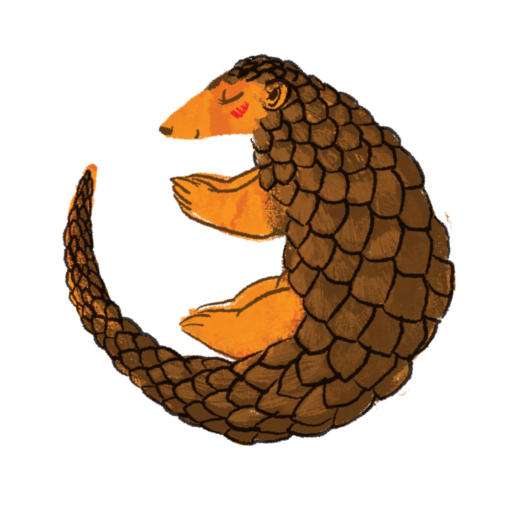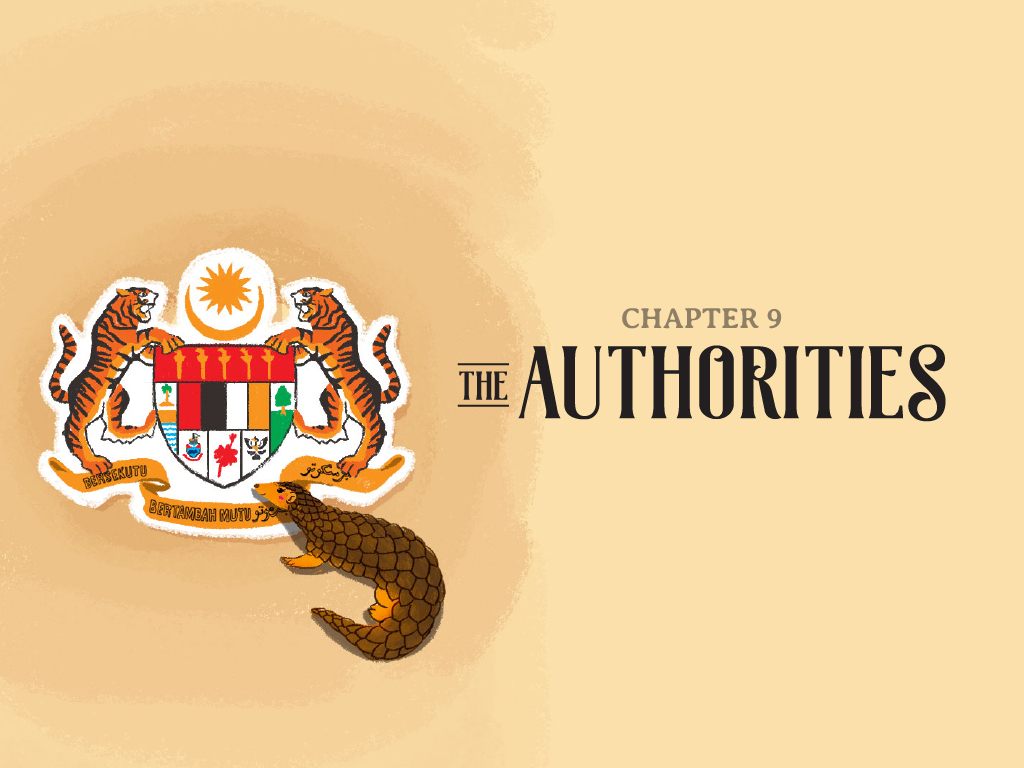


hen we ask Datuk Zainuddin Yaacub, who is the chief of the Kedah State Police Headquarters (IPK Kedah), about the involvement of officers from his station in pangolin smuggling, he corrects us: “Not ‘involved’, they are suspected of being involved.”
“True, there are some who have not been convicted yet,” we say politely. “But some have already been sentenced, Datuk.”
“I’ll need to check,” he replies.
To date, three police officers from IPK Kedah have been arrested for being in possession of live pangolins. Government sources close to ongoing investigations have shown us evidence of nine other officers connected to the smuggling activities, most of whom are stationed in Kedah.
“We take this matter seriously,” the police chief finally says. “If police officers are charged and convicted, we can suspend them from their duties. If they are convicted of criminal charges, we can even discharge them.”
“There is corruption in all countries, including Malaysia. But… we do not condone it.” - Datuk Abdul Kadir Abu Hashim, Perhilitan Director General
Both the Inspector General of Police and the Malaysian Anti-Corruption Commission have promised further investigations into corruption allegations against policemen at the border, which was reported by R.AGE in Sept 2019.
Perhilitan director general Datuk Abdul Kadir Abu Hashim is no stranger to corruption allegations. After all, his department has been the subject of many of them since the early 2000s, stretching back before his tenure as director general.
In 2013, Al Jazeera famously reported on an allegedly cosy relationship between wildlife officers and renowned smuggler Anson Wong, a smuggler so prolific that he is known as ‘The Lizard King’.
“There is corruption in all countries, including Malaysia,” Datuk Abdul Kadir says, when asked if corruption continues to be a challenge for him. “But from our department’s viewpoint, we do not condone it.”
“If there are allegations and they are proven to be true, we will take action against any corrupt staff.”
However, corruption is just one of the many challenges he and his department face in protecting Malaysia’s pangolins.
Smuggling syndicates are constantly changing their modus operandi, and the cross-border nature of the crimes makes it difficult to police. When it comes to other wildlife, guarding Malaysia’s dense rainforests against professional poachers is also a challenge. In addition to the difficult terrain, these poachers are often armed and dangerous.
One key strategy towards improving wildlife protections is legislative change.
WATCH: R.AGE interviews Water, Land and Natural Resources Minister Dr Xavier Jayakumar on wildlife conservation in Malaysia
“At present, Perhilitan is in the process of amending the Wildlife Conservation Act, to combat this smuggling. The amendment is to increase the penalties. For example, smuggling totally protected species (like pangolins) will incur a maximum of RM1,000,000 and 10 years’ prison.”
The law currently allows a fine of up to RM100,000 and/or three years’ prison. Abdul Kadir added the amendments are expected to be tabled in Parliament this year.
“We need this (amendment) as a deterrent, otherwise these people won’t stop,” he said, citing a number of past cases where smugglers simply paid the fines and continued trading.
Minister of Water, Land and Natural Resources Dr. Xavier Jayakumar has a slightly different emphasis: “As far as wildlife are concerned, I would concentrate more on awareness and education,” he says. “If through education we can get a sense of ownership (over the wildlife), then things will change in this country.”

When we ask Datuk Zainuddin Yaacub, who is the chief of the Kedah State Police Headquarters (IPK Kedah), about the involvement of officers from his station in pangolin smuggling, he corrects us: “Not ‘involved’, they are suspected of being involved.”
“True, there are some who have not been convicted yet,” we say politely. “But some have already been sentenced, Datuk.”
“I’ll need to check,” he replies.
To date, three police officers from IPK Kedah have been arrested for being in possession of live pangolins. Government sources close to ongoing investigations have shown us evidence of nine other officers connected to the smuggling activities, most of whom are stationed in Kedah.
“We take this matter seriously,” the police chief finally says. “If police officers are charged and convicted, we can suspend them from their duties. If they are convicted of criminal charges, we can even discharge them.”
Both the Inspector General of Police and the Malaysian Anti-Corruption Commission have promised further investigations into corruption allegations against policemen at the border, which was reported by R.AGE in Sept 2019.
Perhilitan director general Datuk Abdul Kadir Abu Hashim is no stranger to corruption allegations. After all, his department has been the subject of many of them since the early 2000s, stretching back before his tenure as director general.
In 2013, Al Jazeera famously reported on an allegedly cosy relationship between wildlife officers and renowned smuggler Anson Wong, a smuggler so prolific that he is known as ‘The Lizard King’.
“There is corruption in all countries, including Malaysia,” Datuk Abdul Kadir says, when asked if corruption continues to be a challenge for him. “But from our department’s viewpoint, we do not condone it.”
“If there are allegations and they are proven to be true, we will take action against any corrupt staff.”
However, corruption is just one of the many challenges he and his department face in protecting Malaysia’s pangolins.
Smuggling syndicates are constantly changing their modus operandi, and the cross-border nature of the crimes makes it difficult to police. When it comes to other wildlife, guarding Malaysia’s dense rainforests against professional poachers is also a challenge. In addition to the difficult terrain, these poachers are often armed and dangerous.
One key strategy towards improving wildlife protections is legislative change.
R.AGE interviews Water, Land and Natural Resources Minister Dr Xavier Jayakumar on wildlife conservation in Malaysia
“At present, Perhilitan is in the process of amending the Wildlife Conservation Act, to combat this smuggling. The amendment is to increase the penalties. For example, smuggling totally protected species (like pangolins) will incur a maximum of RM1,000,000 and 10 years’ prison.”
The law currently allows a fine of up to RM100,000 and/or three years’ prison. Abdul Kadir added the amendments are expected to be tabled in Parliament this year.
“We need this (amendment) as a deterrent, otherwise these people won’t stop,” he said, citing a number of past cases where smugglers simply paid the fines and continued trading.
Minister of Water, Land and Natural Resources Dr. Xavier Jayakumar has a slightly different emphasis: “As far as wildlife are concerned, I would concentrate more on awareness and education,” he says. “If through education we can get a sense of ownership (over the wildlife), then things will change in this country.”